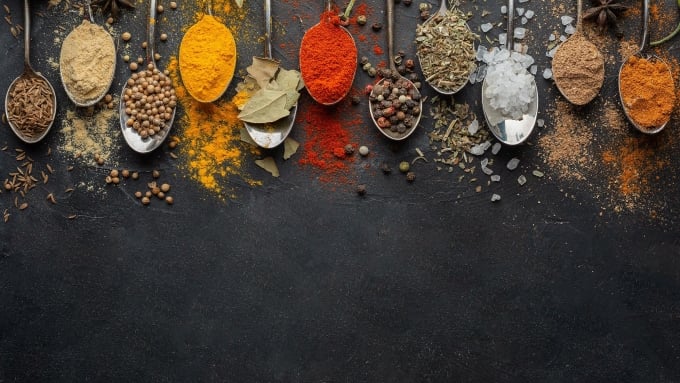Cooks should protect their face, nose, and mouth; season food appropriately; and ensure the kitchen is well-ventilated to minimize respiratory irritation.
Vietnamese people use many spices such as pepper, garlic, and turmeric to enrich their daily meals. However, some spices can affect the respiratory tract, exacerbating pre-existing respiratory conditions.
Dr. La Quy Huong, from the Respiratory Department of Tam Anh General Hospital in Hanoi , noted that powdered spices are small in size, suspended and dispersed in the air, easily inhaled, and can affect respiratory function. People with chronic respiratory diseases such as asthma or chronic obstructive pulmonary disease (COPD) who choke on powdered spices may experience dangerous exacerbations.
Doctor Huong advises on how to use spices when cooking to ensure health safety.
Cooking in an open space
Many families use gas or wood-burning stoves, which can generate harmful amounts of CO2 and CO. Kitchen spaces should be well-ventilated to minimize exposure to these toxic gases.

Powdered spices can irritate the respiratory tract. (Image: Freepik)
Season to taste.
Some spices, like peppercorns, don't dissolve during cooking and can be easily inhaled or swallowed, potentially causing coughing and sneezing. Adding too many spices, resulting in dishes with strong, overly sour, or excessively spicy flavors, can irritate the respiratory tract.
Use fresh ingredients.
Prioritize using fresh ingredients to minimize exposure to powdered spices. Spices that provide color and flavor, such as garlic, chili, ginger, and turmeric, are easier to store and use in fresh form.
Fresh ingredients like garlic, onions, and shallots contain a lot of essential oils and have a strong smell. Homemakers can apply some tricks such as refrigeration, burning, or soaking in vinegar to reduce the amount of essential oils released during food preparation.
Protect your eyes, nose, and mouth while cooking.
Dr. Huong stated that the principle for minimizing the risk of respiratory irritation is to avoid contact with the triggers. Cooks can protect their eyes, nose, and mouth by wearing glasses, masks, or face shields to prevent droplet transmission.
Coughing and sneezing are natural reflexes of the body when exposed to foreign objects. Doctor Huong advises that people who choke when exposed to powdered spices should try to cough to expel the foreign object. If they still cannot clear their airways, they can drink water to reduce the risk of allergens adhering to the mucous membranes of the respiratory tract.
In cases where patients with chronic respiratory diseases experience airway irritation, family members should carefully observe and address the situation. The patient may use bronchodilators and should go to the hospital for examination.
Khue Lam
| Readers can submit questions about respiratory illnesses here for doctors to answer. |
Source link




![[Photo] General Secretary To Lam presides over a meeting with the Editorial Teams to summarize 100 years of the Party's leadership of the Vietnamese revolution and 40 years of implementing the National Construction Program.](https://vphoto.vietnam.vn/thumb/1200x675/vietnam/resource/IMAGE/2026/03/04/1772601288977_a1-bnd-8134-7576-jpg.webp)











































































![[Photo] Prime Minister Pham Minh Chinh presides over the regular Government meeting in February.](https://vphoto.vietnam.vn/thumb/402x226/vietnam/resource/IMAGE/2026/03/04/1772606688233_ndo_br_42i9852-jpg.webp)




































Comment (0)